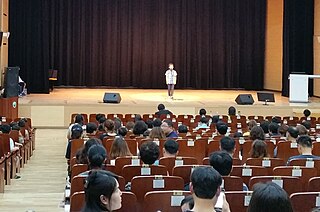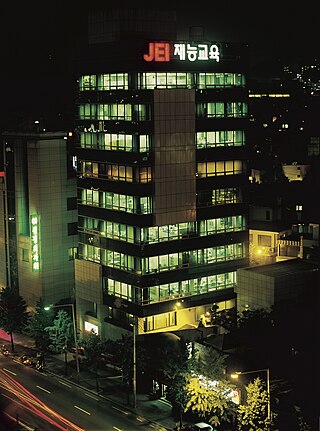Related Research Articles
Toji (Korean: 토지), known in English as Land, is a 16-volume Korean novel written by Park Kyong-ni from 1969 to 1994. It tells the story of five generations of a wealthy Korean family from South Gyeongsang Province. The novel was very popular in South Korea, where it was made into a television series. Part I was translated into English by Agnita Tennant, as part of a UNESCO Collection of Representative Works project.
Kim Jae-young is a South Korean writer and professor. She is an author that articulates pressing societal issues such as diaspora and neoliberalism from the perspectives of the marginalized and minorities. Kokkiri, which represents migrant workers’ issues through the use of mythic and archetypal symbols, is her most representative work.
The Society of Korean Poets (Korean: 한국시인협회) is a literary organization established in 1957. It is the oldest active poetry organization in South Korea.

Si-nangsong refers to the Korean poetry recitation style, which conveys emotions by memorizing poems.
Kim Sung-woo is honorary poet and journalist of South Korea.

JEI Corporation is a Korean educational company founded in 1977. Currently, the headquarters is located at 293 Changgyeonggungro, Jongno-gu, Seoul. The company is known for its supplementary education programs for children and adults. JEI offers supplementary learning programs for home education, operating self-learning centers for children and establishes a general education network in various fields including publishing, broadcasting, IT, printing, distribution, culture and arts. In particular, the company has been supporting Si-nangsong(poetry recitation) for 27 years since 1991. The founder, Sung-hoon Park, was honored as an honorary poet at the Society of Korean Poets for his contribution to promote the 'Si-nangsong' in Korea. Also, the JCC Art Center located in Hyehwa-dong, recognized as the only work of renowned Japanese architect Tadao Ando in downtown Seoul, is owned and operated by JEI. Outside of S. Korea, JEI's learning program is offered in U.S., Canada, China, Japan, Australia and New Zealand exporting its ‘JEI’ brand globally.
Kim Kyungrin was a South Korean poet. In a changing world, he pursued poetry that embodied modern gazes and expressions. Along with Park In-hwan and Lee Bong-rae, Kim led the modern poetry movement in South Korea in the 1950s. When postmodernism became a global trend in the 1980s, he actively accepted and incorporated concrete poetry, projective verse, and minimalism in his poetry and poetics.
Kim Nyeon-gyun is a Korean poet. Since his debut in 1972, he has been active as a poet, writer, and essayist. He has also served various Korean literary organizations, such as being a board member of the Korean Centre of PEN International and the board director of the Korean Writers' Association. Kim's poetry depicts lives of pain and suffering on the surface, but paints the joy and beauty of life through the desire for resurrection and renewal on the inside.
Ip sog-ui geomeun ip is a poetry collection written by Ki Hyongdo.
Ha Sangwook is a South Korean poet. He writes short poems based on daily lives. He calls himself "Sipari", an acronym meaning a person who sells poems. He published the bestseller poetry collection Seoul Si in 2013.
Jung Hanmo (1923–1991) was a Korean poet. The primary subject matter of his poems was the bleak reality after the Korean War but he wrote poems representing his love for life and hope for the future. He taught Korean literature in universities for a long time, leaving many achievements as a scholar. When he was the Minister of Culture and Public Information in 1988, he decisively carried out the lifting of the ban on around 100 writers who had defected or had been kidnapped to North Korea.
Gisangdo is a Korean poem written and published by Kim Kirim in 1936. Gisangdo is a satirical poem that compared the volatile state of international affairs in the 1930s to the development of a typhoon. The poem has been lauded as a prime example of the modernism of Kim Kirim, a man who attempted to imbue his poems with an awareness of modern civilization.
Sŏ Ir-ok is a Korean sijo poet. Since her debut as a poet in 1990, she has written realist sijo poems with gritty descriptions of Korean society, based on her interest in the marginalized.
Kiwan Sung is a Korean poet and musician. He is noted for his avant-garde, experimental poems in the literary world. He aims to write poetry that is completely different from any preexisting poems and has tried many experimental attempts, such as putting music (sound) and poetry together. Sung's major work is the poetry collection Rieul. He is currently working as a professor of sound art.
Yi Yongak (1914–1971) was a Korean reporter and poet who wrote about the injustices of the Japanese occupation of Korea and about the political system of North Korea.
Cho Yongmee is a South Korean poet. She writes poems based on her experience of nature and landscapes through her various senses such as vision, touch and hearing rather than using the abstract and notional mode of expression. Her poems show different aspects of normal phenomena from her sensitive perspective.
Kim Sa-i is a Korean poet. Departing from the pre-existing poetry about labor whose emphasis is on its purpose, she writes poems that fully represent the life experiences of the working people. Especially, her interest lies in the structural alienation of women workers engendered by patriarchy. Being a former laborer herself, she continues to participate in activism to support the working people.
Cho Taeil (1941–1999) was a Korean poet. He was one of the poets who actively engaged in social matters during the Yushin era, and led the Minjung poetry in the 1970s along with Shin Kyeongrim and Kim Jiha. He launched a poetry magazine, Siin and played a leading role in establishing the Council of Writers for Freedom and Practice.
Choe Dooseok is a Korean poet. Since his debut in 1980, he has continued to write poems that combine facticity with lyricism. His poems are considered compassionate toward objects, and at the same time, equipped with keen insight into reality. He argued for narrative poetics from a realist perspective.
References
- ↑ 한명뿐인 명예시인 김성우 http://newslibrary.naver.com/viewer/index.nhn?articleId=1987110400329202006&edtNo=3&printCount=1&publishDate=1987-11-04&officeId=00032&pageNo=2&printNo=12955&publishType=00020
- ↑ 명예시인된 재능 박성훈 회장 http://news.naver.com/main/read.nhn?mode=LSD&mid=sec&sid1=102&oid=086&aid=0000072297
- ↑ 신창재 교보생명 회장, 명예시인 된다 http://www.edaily.co.kr/news/news_detail.asp?newsId=03056966615796736&mediaCodeNo=257&OutLnkChk=Y